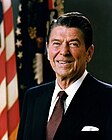Republican Party presidential primaries, 1980
|
|
|||||||||||||||||||||||||
|---|---|---|---|---|---|---|---|---|---|---|---|---|---|---|---|---|---|---|---|---|---|---|---|---|---|
|
|||||||||||||||||||||||||
|
|||||||||||||||||||||||||

Red indicates a win by Reagan, blue a win by Bush.
|
|||||||||||||||||||||||||
|
|||||||||||||||||||||||||
The 1980 Republican presidential primaries were the selection process by which voters of the Republican Party chose its nominee for President of the United States in the 1980 U.S. presidential election. Former California Governor Ronald Reagan was selected as the nominee through a series of primary elections and caucuses culminating in the Republican National Convention held from July 14 to July 17, 1980, in Detroit, Michigan.
As the 1980 presidential election approached, incumbent Democratic President Jimmy Carter appeared vulnerable. High gas prices, economic stagflation, a renewed Cold War with the Soviet Union following the invasion of Afghanistan, and the Iran hostage crisis that developed when Iranian students seized the American embassy in Tehran all contributed to a general dissatisfaction with Carter's presidency. Likewise, the president faced stiff primary challenges of his own from Senator Ted Kennedy and California Governor Jerry Brown. A large field of Republican challengers soon emerged. Former Governor Ronald Reagan was the early odds-on favorite to win his party's nomination for president after nearly beating incumbent President Gerald Ford just four years earlier. He was so far ahead in the polls that campaign director John Sears decided on an "above the fray" strategy. He did not attend many of the multicandidate forums and straw polls in the summer and fall of 1979.
...
Wikipedia



